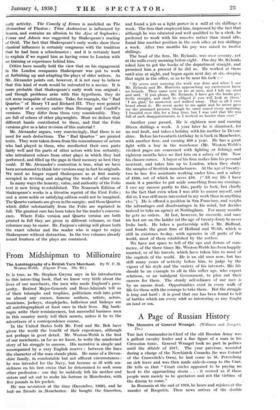From Midshipman to Millionaire The Autobiography of a British Yarn
Merchant. By W. F. M. Weston-Webb. (Cayme Press. 10s. 6d.) IT is true, as Mr. Stephen Gwynn says in his introduction to this interating book, that we know very little about the Jives of our merchants, the men who made England's pros- perity. Retired Major-Generals and Rear-Admirals tell us of their triumphs and trophies, politicians rush into print on almost any excuse, famous authors, artists, actors, musicians, jockeys, steeplejacks; ballerinas and bishops are all autobiographical at least once in their lives. Big bank- rupts. write their reminiscences, but successful business men in this country rarely tell their secrets, unless it be to the advertisers of a correspondence course.
In the' United States' both Mr. Ford and Mr. Bok have given the world the benefit of their experience, although not perhaps in great detail. Mr. Weston-Webb is the first of our merchants, as far as we know, to write theunadorned story of his struggle to success. His narrative is simple and accompanied bjt a very English reserve : between the lines the character of the Man stands plain. He came of a Devon; shire family, in comfortable but not affluent circumstances : he was intended for the Navy, but became so ill with sea- sickness on his first cruise that he determined to seek some other profession : one day he suddenly left his mother and sisters and set out to make his .fortune in Manchester, with five pounds in his pocket.
He was seventeen at the time (December, 1868), and he had-no . friends in ;Manchester. .He bought the --Guardian;
and found a job as a light porter in a mill at six shillings a week. The firm that employed him, impressed by the fact that although he was educated and well qualified to be a clerk, he preferred to work with his muscles rather than stand idle, found him another position in the cash office at ten shillings a week. After two months his pay was raised to twelve shillings.
The head of the firm, Mr. Rylands, was over seventy, yet at the mills every morning before eight. One day Mr. Rylands asked him to get the books of the department straight, and promised him .a present if he did so. He worked at them until nine at night, and began again next day at six, sleeping that night in the office, so as to be near his task :— " By seven next morning the work was done and when I saw Mr. Rylands and Mr. Horrocks approaching my excitement knew no bounds. They came over to me at once, and I left my stool and said, If you please, Mr. Rylands, I have got the 'books per- fectly straight, and shall be obliged if you will look at them.' I am glad, he answered, and walked away. That is all I ever heard about it. He never spoke to me again and he never gave me the promised present, though he came round every morning. I brooded over this for a long time, but I was told that life was full of such disappointments, so I worked on harder than over."
Another year passed.. He is eighteen now and earning fifteen shillings a week. A year later he is dismissed, for no real fault, and takes a holiday with his mother in Devon- shire. Before his twentieth birthday he is back in Manchester, with another firm, and earning £60 a year. He has a great fight with a boy' in the warehouse (Mr. Weston-Vrebb's
vividest pages are concerned with fighting or fishing), and eighteen months later we find him on a salary of £80. Now his chance comes. A buyer of his firm makes him his personal assistant, and takes him up to London, when they study the samples of Scottish manufacturers. At the age of twenty- two he has five assistants working under him, and a salary of 1100, out of which he saves 110. ("All my life I have made it a practice to put aside something from my earnings.
I owe my success partly to this, partly to luck, but chiefly to the fact that even when I was able to amuse myself, and did so, I was still more interested in my work than in anything else.") He is offered a position in San Francisco, and weighs the advantages and disadvantages in his mind, but decides instead to take an agency at Nottingham. For many months he gets no orders. At last, however, he succeeds, and once his feet are on the ladder (at the age of twenty-four) he never looks back. He takes a partnership with a Mr. Holland, and founds the great firm of Holland and Webb, which is still in existence to-day, with agencies in all parts of the world, most of them established by the author.
We have not space to tell of the ups and downs or com- merce, of the three times Mr. Weston-Webb has been happily married, or of his travels, which have taken him to most of the capitals of the world. He is an old man now, but has still many years of activity before him, to judge by the vigour of his style and the variety of his interests. His life should be an example to all in this softer age, who expect relations, or an indulgent Government, to plan out their careers for them. The sturdy self-reliance of our race is by no means dead. Opportunities exist in every walk of life for those with the courage to take them. But the struggle is long and hard : it is good that one has been found to tell of battles which are every whit as interesting as any fought on land or sea.










































 Previous page
Previous page